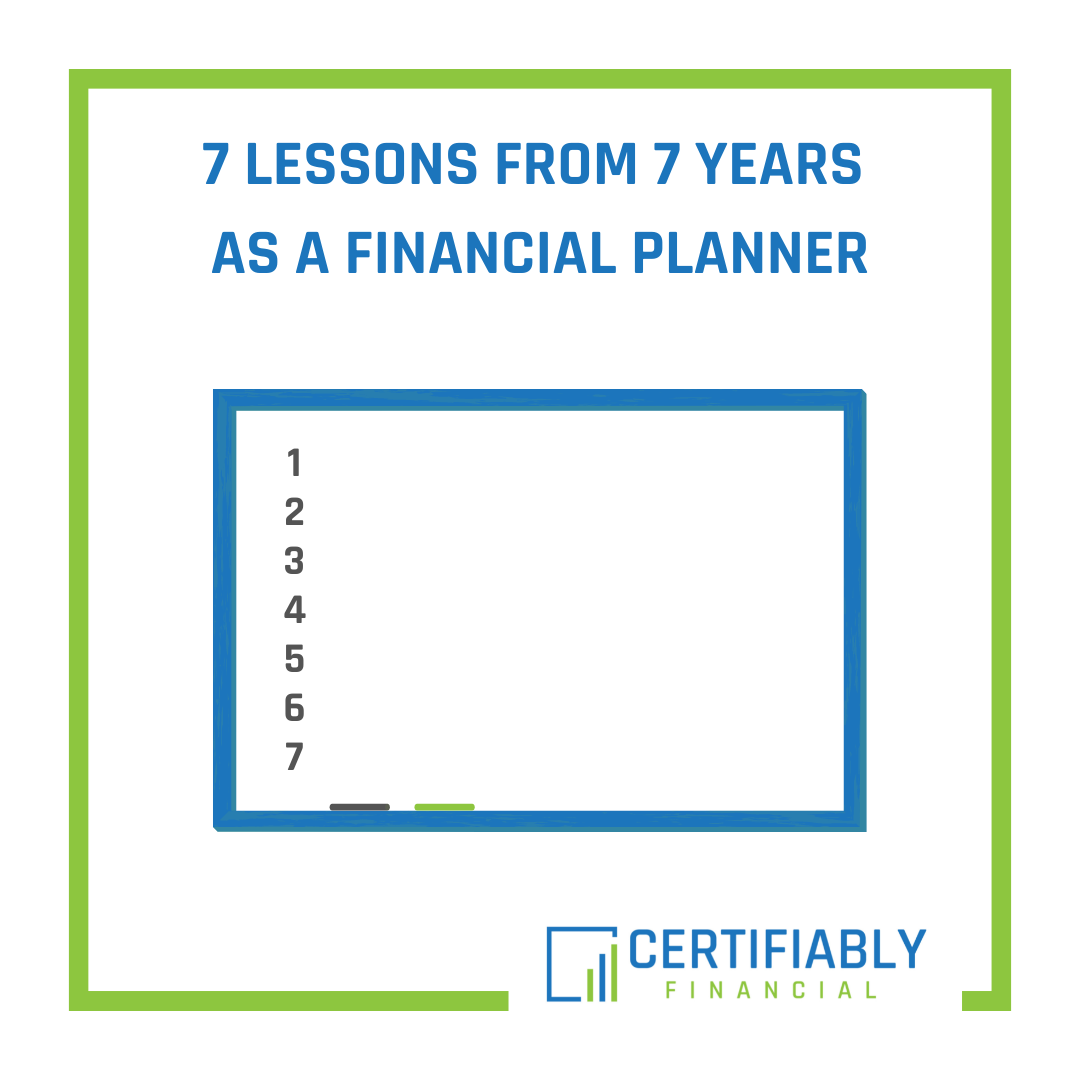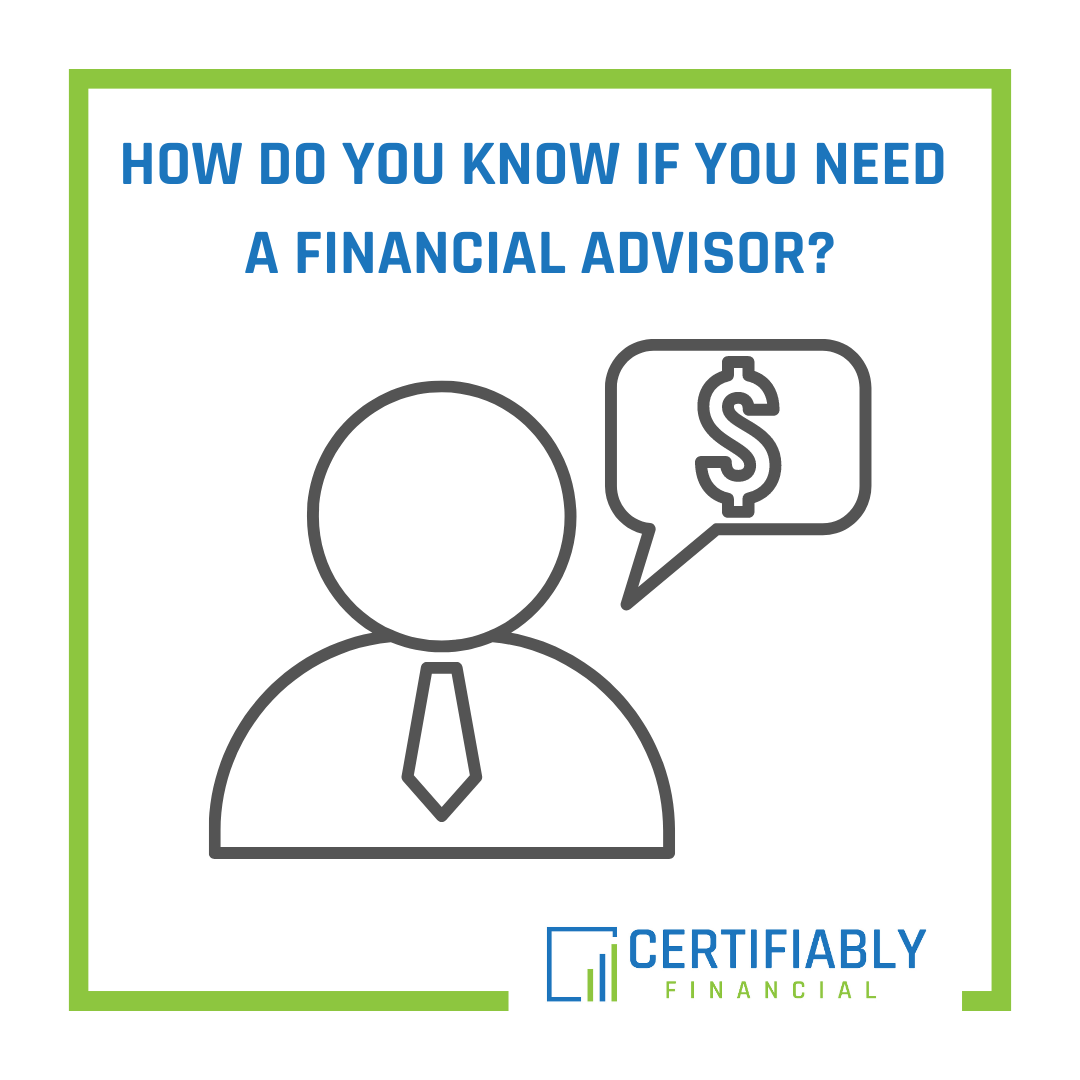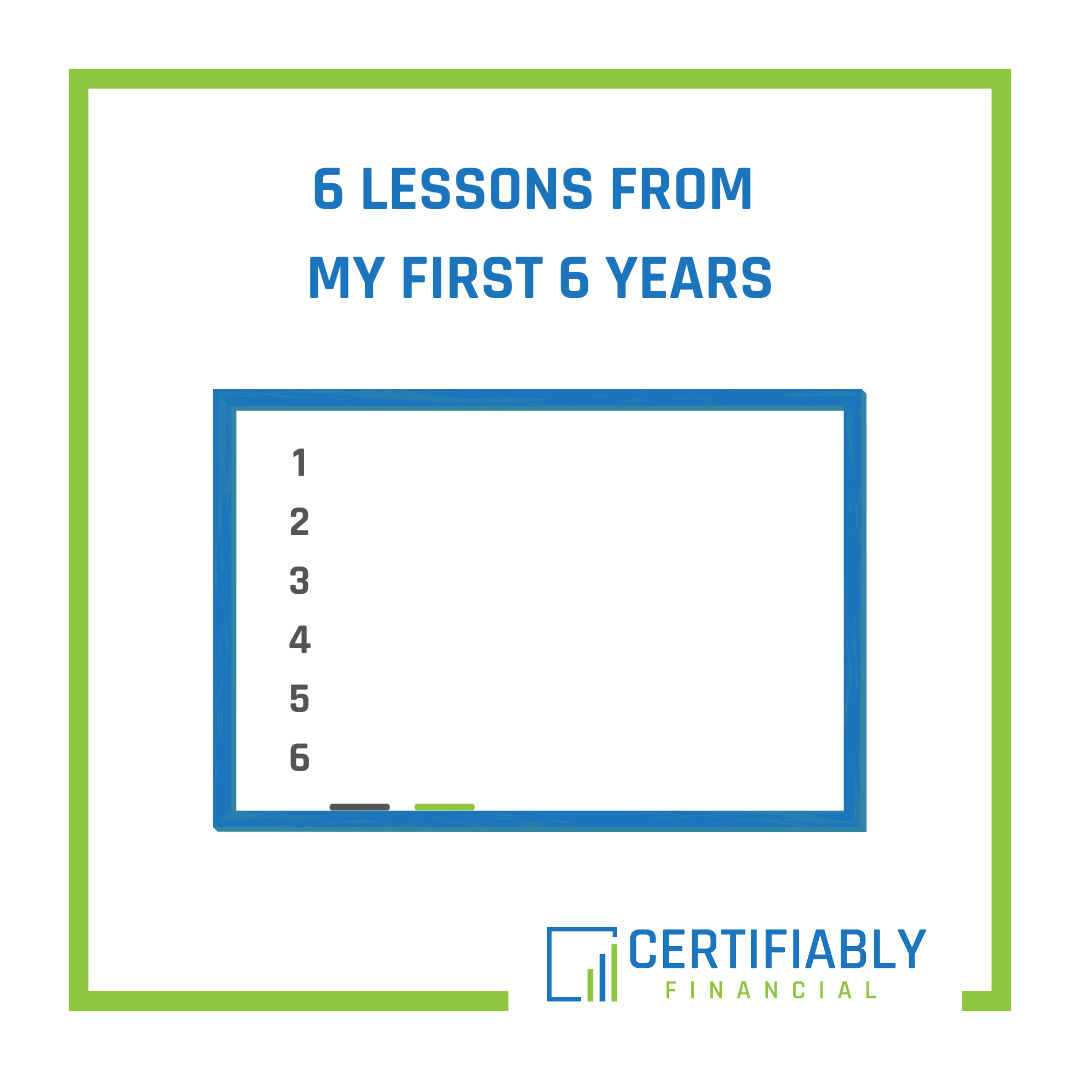It’s been 76 days since I published my last blog post on Certifiably Financial. This is by far the longest amount of time between posts since I first shared the blog with the world on June 11, 2018. I used to have ideas of what I should write about all the time, but I’ve been experiencing writer’s block this year. That, coupled with not prioritizing time for writing and making a habit to do it even when I don’t want to, don’t have an idea, or don’t feel like I have enough time, has led to me slacking.
Financial Planner
How Do You Know if You Need a Financial Advisor?
I was speaking about personal finance to a group last weekend when someone asked the question, “How do you know if you need a financial advisor?” I thought that this was a great question, but one that’s not necessarily easy to answer.
6 Lessons from My First 6 Years
My first day working in a financial planning firm was Monday, May 12, 2014. That was the first day of my internship with the firm that I still work at today 6 years later. I was just like most other people going into college. I had no idea what I wanted to do, but I thought I wanted to major in business. I went through my first two years of college taking classes and narrowing down my interests until I came down to operations and supply chain management and finance.
Hire A Pro
As I mentioned in my last post, I recently moved to a new apartment and it pretty much took a whole day. This reaffirmed that moving may be the thing that I hate most in the world. It’s just a cumbersome process from packing to cleaning to loading everything up to driving to unloading everything to unpacking and on and on and on. I thought that Amanda and I didn’t have much stuff until we started packing and loading everything. And I’m still pretty sure that we have less stuff than a lot of people our age, which is scary to me. There was so. Much. Stuff. We ended up taking two truck-loads to Goodwill and countless other bags to the dumpster and still had a ton left over to move.
Details Matter
4 minute read
I’m passionate about financial planning because it’s a profession that allows me to put my skills to work helping others in an area of life that most people can use help. Although I know I stray from this line of thought often, I was raised to always try to put others first and think of them before considering my own wants and needs. Unfortunately, it seems that there are many others in the financial services industry who consider their own wants and needs before thinking of their clients.
Don’t Be Left In The Dark
The reason I’m writing this is due to two separate situations that I’ve been made aware of recently. One of the situations is something that someone I work with discovered when combing through a new client’s information from their previous financial advisor and one is something that a friend found when exploring a new client’s financial information from a former advisor. Both show how easy it is for investors to be left in the dark if they’re not working with someone trustworthy.
The first situation that I mentioned above is something that my boss found when reviewing a new client’s Indiana CollegeChoice 529 Savings Plans that were setup for them by a financial advisor who works for a financial services firm with a household name. It’s great that the clients have these plans in place and are already saving for college for their young children, but this was an “Advisor” plan rather than a “Direct” plan. This means that the financial advisor set up the plan for the clients and managed the investments within the plan rather than the client setting up the plan themselves and choosing the investments.
The clients were being charged 4.75% on every single deposit they made into the accounts, and that was after receiving a discount from the 5.5% othey were being charged prior to account hitting a certain balance. What a deal.
That’s insane. They had no idea.
This is something that we don’t even charge for at the company that I work at because there isn’t very much value that we can add to managing 529s. We help clients setup a “Direct” account and tell them which investment to choose. There’s not a whole lot more to a 529 than that although the example above seems to indicate that there are other financial services firms that think so.
Free Account
The second situation is one that one of my friends came across when reviewing information for a prospective client. The client’s current financial advisor told her that her account is free with no annual fee. (Remember our discussion about free above?)
Notice how the message was framed to her. “The account is free with no annual fee.”
Technically, she isn’t paying an annual fee for the account. What she is paying is the up to 5.75% up-front commission on all of the mutual funds she purchases within the account in addition to the ongoing expense ratios on the mutual funds, one of which is 5.5%. Most are at least 1.2%.
I can imagine where most of the money being made off of that “free” account is going.
Know Who You’re Working With
Just because your friend or family member got a new job as a financial advisor where they’re required to sell products and they start with pitching them to their friends and family doesn’t mean that you have to, or should, work with them. Isn’t it kind of scary how easy it is for someone with no financial experience to get a position like that which could have significance long-term consequences on those they’re selling to?
I’m very fortunate to have a degree in financial planning and to have learned about all aspects of the financial services industry. Most who work within the industry haven’t been fortunate enough to experience this type of education and be exposed to all the different sides of the industry and how each is compensated.
I believe that some people who are selling these awful financial products to others genuinely believe that they’re doing a great job helping them and that they’re doing something good for the client. I think a lot of financial salespeople don’t even know that there’s another side of the industry and that there’s an option to always work as a fiduciary in the client’s best interest. They’ve simply been told that they have an opportunity for a solid job with high income potential and that’s the extent of their knowledge on the industry.
Unfortunately, there are those who know about all sides of the industry and know that there are better options for their clients but are more motivated by continuing to line their own pockets. Oftentimes people who works at these types of firms are simply salespeople who passed basic level securities exams to keep them out of prison, not educate them on financial planning. Many have no background or previous experience in finance or financial planning. It may be harsh, but it’s true.
Eliminate Conflicts of Interest
Stories like those above demonstrate exactly why I chose to work at a fee-only, independent RIA and not sell products or be paid on commission. Commission-based advisors inherently operate under a conflict of interest. No matter what product is best for your situation, they’re incentivized to sell you the one that makes them the most money, pays their mortgage, and feeds their family.
Maybe now you’re even more paranoid to work with a financial planner because of these stories. Or (hopefully) you’re more motivated to audit your current financial professional’s recommendations and the things that you’ve implemented in your own financial life. Either way, here are some things that you can do to help make sure that you’re working with someone who is obligated to always work in your best interest. I’ll repeat a few of them below.
- Work with a CFP professional
- Work with a NAPFA-Registered Financial Advisor
- Ask them if they act as a fiduciary for you at all times
Why You Should Use A Young Financial Planner
4 minute read
Motivation
Who do you think is more motivated, someone who is young and beginning their career or someone who is established, has been doing the same thing for 30 years, and is on the verge of retirement? The answer to that question seems like a no-brainer to me.
Many older financial planners were brought up in the product sales environment rather than the true financial planning environment. You know the drill – they continue going to the same networking events or finding clients at the same places they always have, sell them some sort of financial product, and never have much personal contact with them again. And the next thing you know, they have hundreds of clients and don’t know anything about most of them outside of their names.
By this time, they’re living very comfortably and don’t have to worry too much about providing more value to their clients because people hate change and continue to stick with “their guy”. However, the new age of financial planning is different. No longer is it solely focused on financial product sales, but is shifting more towards requiring financial professionals to actually provide financial planning services and advice.
Going forward, financial planners will be required to provide more value to their clients and maintain great relationships as their services become more and more commoditized. This may not always be the case, but an older financial planner may be ready to retire and continue coasting along rather than continuing to grow as the profession progresses. Younger planners are more motivated to continue learning and doing the best for their clients. They aren’t going to coast along because they have decades of their careers left that they need clients to stick with them.
Time Horizon
Would you rather work with someone who’s likely to stick with you throughout your career or someone who may not be working for much longer? A financial planning relationship requires a long-term mindset from all parties involved and working with someone who can guide you throughout your financial journey rather than only a few years can provide a huge benefit. Someone who has studied financial planning and loves practicing it as a profession will be there for you over the long haul and will be able to guide you throughout the many situations you’ll face throughout your lifetime.
Younger financial planners are likely to have the support of other older and more experienced planners who they can go to for advice and help. So, if you’re worried because they’re “green” or “inexperienced”, you should know that they do have access to experienced advisors who they can speak with and get help from. If you’re not sure whether they maintain these types of relationships or not, just ask.
Even younger planners who start solo firms typically maintain a solid network of diverse mentors. In fact, in my experience with those who I know in the industry, they’re probably better at because they don’t want to feel like they’re going at it alone despite owning their own firm. On the other hand, those who work within financial planning firms already have built in mentors who they can go utilize so they have less need to find outside professionals who they can go to for help.
Having these mentor relationships in place can help a young financial planner be successful in the early stages of their career and lead to a long, successful financial planning relationships.
Education
It can be argued that an older financial planner has more experience and knowledge than a younger planner, but younger planners have been highly educated on the profession more recently with the most up-to-date best practices and information. An older financial planner is probably less motivated to stay up-to-date with the most recent findings and best practices if they’re planning on retiring soon. How many 60-year-old financial planners do you think are actively educating themselves about things like crypto currency and new financial planning technologies? How many financial planners in their 20s-40s do you think are doing so?
More experienced planners have sat through the same continuing education sessions hundreds of times and can recite them word-for-word while shooting off emails the whole time. However, I believe that younger planners have more motivation to educate themselves and become experts on certain subjects. Additionally, they have more access to innovative and exciting professional education through the use of technology and being able to connect with peers through asking questions and reading discussions in professional forums and financial planning specific social media groups. It’s not the same old continuing education sessions that you sit through at the quarterly FPA meeting.
While there’s no denying that older financial planners have more experience and potentially more technical financial planning knowledge than young financial planners, there are great advantages to working with a younger professional. Not only will they be motivated to do their best and maintain a great relationship with you by providing you with great advice and recommendations based on the most up-to-date information and best practices, but they also have a time horizon that may be more aligned with yours that will allow you to have a successful long-term relationship.
Why You Need A Financial Planner Who ALWAYS Acts As A Fiduciary
3 minute read
Fiduciary
A fiduciary is someone who is required to ALWAYS act in their client’s best interest. CERTIFIED FINANCIAL PLANNER™ professionals are required to act as fiduciaries to their clients. However, the CFP Board has made it easy on those in the financial product sales industry by not always requiring them to follow a fiduciary standard. So, how do you know if your financial planner will ALWAYS act as a fiduciary to you? Ask them. They’re required to tell you if there are times that they won’t be acting as a fiduciary for you.
There’s a significant difference between a financial planner and a financial salesperson. Just because someone calls themselves a financial planner doesn’t mean that they’re truly acting in your best interest, or that they even do any real financial planning. Fortunately, the National Association of Personal Financial Advisors (NAPFA) is an organization that only allows fee-only CERTIFIED FINANCIAL PLANNER™ professionals to join their organization. Working with a fee-only financial planner can provide the peace of mind of knowing that they are working for you rather than working for a commission.
Fiduciary Standard Vs Suitability Standard
Most of the financial services industry does not act under the fiduciary standard. Most financial services professionals act under the suitability standard. This means that they only have to provide you advice that’s “good enough”, or suitable, for you rather than being required to provide advice that’s in your best interest. Does this seem right to you?
Michael Kitces states the difference between the fiduciary and suitability standards well: “One is for advisors, the other is for salespeople.” I’ll let you guess which one is which. He also has a great analogy to explain the difference between these two standards: “Suitability means selling a suit that fits you. Fiduciary duty means it actually has to look good on you, too.” No one wants to end up buying a suit on the recommendation of a salesperson just to get home and be told by an objective third party that it’s way too big, that it’s baggy, and that it looks unprofessional.
Work With A Fiduciary
I believe it’s so important to work with a financial planner who ALWAYS acts as a fiduciary because it means that you know you’ll always receive the best advice for your situation. Don’t get me wrong, there are some great people who really care for their clients who work under the suitability standard, but what do you think the likely outcome is when they’re faced with selling a client a product that costs more, will earn them a significantly higher commission, and gets the job done for their client or selling a different product that will cost the client less money, will earn the salesperson a smaller commission, but is the better option for the client? I’m afraid that, too often, money talks.
It’s important to work with a financial planner that you trust and who you know is always going to be acting in your best interest. I’ve outlined steps to find a trusted partner before here and know that they’re incentivized to do what is right for you.
Why Young Professionals Need A Financial Planner
5 minute read
Develop Good Habits ASAP
Developing good financial habits at a young age is something that can benefit young professionals for the rest of their lives. It’s so much harder for those who have been practicing bad financial habits for 10 or 20 years to change them and begin living a different lifestyle than it is to live a sustainable lifestyle from an early age and develop positive financial habits that will lead to a long-term successful financial life. The decisions that you make when you’re young will affect the rest of your life and can make things much harder or much easier, depending on the choices that you make now.
Waiting to work on your personal finances because you think you’ll be in a better place to do so later is a mistake. Not only could you develop poor financial habits that become ingrained in your daily life as mentioned above, but you could miss out on years of saving and extremely valuable compounded returns. Learning to live within your means isn’t the easiest thing to do for many people. There are so many temptations for your money and we live in a world where instant gratification and “stuff” are placed on a pedestal.
How A Financial Planner Can Help
If you’re not sure what financial planning is, then check out this post before you continue reading.
A financial planner can help young professionals use their money to live a life that they love while maintaining financial prudence. They can help to prioritize goals and allocate resources to align with those goals and a young professional’s values.
Yes, there are some people who do everything right financially and don’t need a financial planner to help them. However, there are also people who do everything right financially and still value the guidance of a trusted advisor and knowing that there is a professional who is working alongside them to make sure that they’re making the best decisions for their personal situation.
Young professionals face tons of questions about their financial lives that they’re not prepared to face themselves beyond how much they should save for retirement:
- What if you were to lose your job tomorrow?
- Do you have an adequate emergency fund in place? Where should you keep the money?
- What if you became disabled and couldn’t work? How would you support your family?
- Or, worst case, what if you died? Sure, you might have life insurance in place, but is it enough? Would you want your young children to have full control of all of your assets?
- How much house can you afford? Should you even buy a house right now?
- Do you plan on saving for your child’s college education? How much? All of it? Half? As much as you can without sacrificing your own goals? What’s the best account to save in? How much do you need to save for college?
- What employee benefits elections should you make during open enrollment?
- Should you be paying extra towards your student loans?
- What assets should you invest your retirement account in?
- Should you buy stocks? Should you sell when you see the market in flux and read negative financial headlines? Should you buy that hot stock you heard about on TV?
- Should you invest in a Roth IRA?
- Are there things you can be doing to save money on taxes?
These are all questions that young professionals have that financial planners can guide them through.
Financial Partner
A financial planner serves not only as someone to help young professional with their financial decisions, but also as a coach, sounding board, and accountability partner.
There are so many decisions to be made when you’re young that will have lifelong impacts on your financial life and here are so many people trying to sell young professionals financial products that are exactly what they do not need. it’s really easy to make mistakes. What young professionals truly need is a fiduciary financial planner that always works in their best interest and is there to help them not only build a solid financial foundation, but also to help them along the way as they progress through their life and career.
A lot of people begin their careers only contributing enough to their retirement accounts to receive the match and making minimum payments on their student loans. However, only contributing enough to receive the match means that you’ll probably start quickly falling behind where your retirement savings should be (unless your goal is to work the rest of your life). Once they realize this or get a raise and decide that they want to start doing something more, they have the question of whether they should pay down their debt more quickly or save more.
Starting a career or a marriage with a strong savings rate is one of the smartest things that young professionals can do. Increasing that savings rate each year, even if only by 1% (which you won’t even notice), is a great idea as well that can have a huge long-term impact.
Saving a significant amount of income helps to not only increase your retirement assets, but also directly helps to decrease your living expenses. You don’t want to reach retirement and have to significantly decrease your standard of living because you’ve been spending such a large part of your income that’s not sustainable once you leave the workforce.
A financial planner helps you to think long-term about decisions such as this and prepare for the future while helping you to make choices like saving more or paying down debt more quickly. They are there not only to help you today, but to walk alongside you throughout your financial journey and help guide your path.
Connections
Financial planners have connections to other professionals such as CPAs, insurance agents, estate planning attorneys, realtors, mortgage brokers, etc. who they believe will be the best for your situation. That way you don’t have to worry about if the person who is trying to sell you a product is actually selling you something worth buying. Your financial planner can act as a neutral party and help you evaluate the product or service and give you a recommendation of what’s best for your personal situation.
Lifetime Benefits
Young professionals have a ton of financial decisions to make that they haven’t been prepared for through high school or college. A financial planner can help to guide you through tough financial choices, create goals and prepare for the future, act as a coach and accountability partner, and provide referrals to other trustworthy financial professionals. Waiting to get serious and take control of your financial life is a mistake. Take the steps outlined here to find a trustworthy personal financial planner who can help you make good financial decisions that will benefit you for a lifetime.
You may have access to all of the personal finance information that you need, but there’s no value in information without action and there’s no value in action without knowing the accurate and appropriate action to take to apply that knowledge to your specific situation.
Become a Financial “Coach” in 60 Days
2 minute read
I keep seeing this Facebook ad for a financial coach training program from one of the very well-known personal finance “experts”. This is the “expert” who spouts advice on his radio show that a lot of the time doesn’t make mathematical sense. He has all kinds of things to sell you on his website but will tell you that you shouldn’t buy products from this person and that person. He calls some things a “tax on stupid” while he’s the one who has monetized preying on those in dire financial situations.
Don’t get me wrong, some of his advice is good and I’m sure that he’s probably helped thousands turn their finances around – something I haven’t had, and probably never will have, the opportunity to do. But how can you suggest that something is or isn’t right for everyone? Financial decisions should be made on a case-by-case basis.
And now he’s going to teach you how to be a “Master Financial Coach” as well so that you can help all your friends and direct them to buy the products that make him rich. Notice that this term is “coach” and not “adviser” or “planner”.
With only a $1,795 investment and 60 days in an online course you can become a Master Financial Coach. Not only that, but it’s actually named after the person who you just paid to receive the designation. (I’m assuming payment plans aren’t offered)
I guess I took the hard route. It took me 4 years of college education, 6 months of studying for a test that has a historical pass rate of around 60%, and 2 years of work experience to obtain my designation through an organization that requires a fiduciary standard, not through a person who stands to make extremely significant financial gain from offering an online course.
Is That Qualified?
Sorry if I sound a little bitter. Maybe I see this the wrong way. Hopefully, this program was designed as a means to help tons of people better their financial situations. However, I can’t help but wonder how many people rely on financial advice from those who have no formal education or actual technical training outside of 60 days of coaching. It seems to me that the person who is selling this course stands to profit significantly with little regard for the potential negative consequences.
Would you trust a doctor who simply took an online course without having any background education or hands-on technical training?
Would you trust a pilot who simply took an online course without having any background education or hands-on technical training?
A lawyer?
A dentist?
A mechanic?
A contractor?
A surgeon?
If you answered “no” to any of these, then it may not be wise to trust your friend who paid to take a 60-day online course to “coach” you with your personal finances. The truth is that while they may be thinking they’re doing a great thing and will be able to help those around them, they could end up making things worse.
Think about the significance that personal finance decisions can have on your life and ask yourself if you’re willing to trust someone who simply took an online course to advise you on those decisions. If so, good luck.









